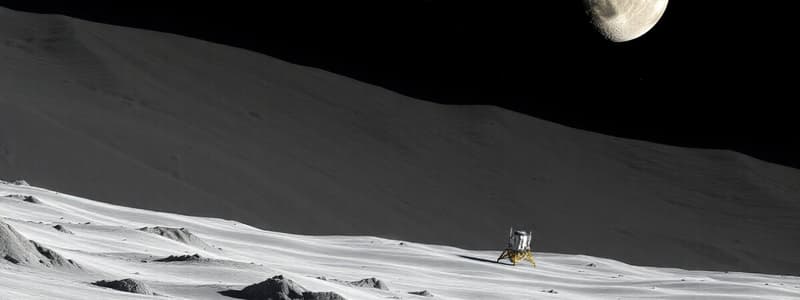Podcast
Questions and Answers
What is the primary significance of the Chang'e 6 mission?
What is the primary significance of the Chang'e 6 mission?
- It collected the largest amount of lunar material to date.
- It successfully landed in the South Pole-Aitken basin.
- It was the first mission to deploy a Chinese flag on the Moon.
- It returned the first ever samples from the far side of the Moon. (correct)
In what lunar region did the Chang'e 6 land and collect samples?
In what lunar region did the Chang'e 6 land and collect samples?
- The near side of the Moon
- The South Pole-Aitken (SPA) basin on the far side (correct)
- The Marius Hills region
- The lunar highlands
What material was used to create the Chinese flag placed on the lunar surface by the Chang'e 6 mission?
What material was used to create the Chinese flag placed on the lunar surface by the Chang'e 6 mission?
- Carbon fiber
- Titanium alloy
- Lunar regolith composites
- Basalt (correct)
What is the name of the spacecraft used in the Chinese mission that returned the lunar samples?
What is the name of the spacecraft used in the Chinese mission that returned the lunar samples?
Approximately how much lunar material did the Chang'e 6 mission return to Earth?
Approximately how much lunar material did the Chang'e 6 mission return to Earth?
What is the significance of the South Pole-Aitken (SPA) basin, where Chang'e 6 landed?
What is the significance of the South Pole-Aitken (SPA) basin, where Chang'e 6 landed?
When did the Chang'e 6 mission launch from China?
When did the Chang'e 6 mission launch from China?
What is the primary objective of distributing the lunar samples collected by Chang'e 6 to researchers?
What is the primary objective of distributing the lunar samples collected by Chang'e 6 to researchers?
Flashcards
What is the South Pole-Aitken (SPA) basin?
What is the South Pole-Aitken (SPA) basin?
A large and ancient impact crater on the Moon's far side, measuring approximately 1,600 miles wide and 5 miles deep.
What is the Chang'e 6?
What is the Chang'e 6?
A Chinese lunar probe named after the Moon goddess, Chang'e, that achieved the first-ever sample return from the Moon's far side.
What is sample return?
What is sample return?
The process of retrieving and bringing back samples from another celestial body, such as the Moon.
What is the Moon's far side?
What is the Moon's far side?
Signup and view all the flashcards
Where did the Chang'e 6 land?
Where did the Chang'e 6 land?
Signup and view all the flashcards
What did the Chang'e 6 bring back?
What did the Chang'e 6 bring back?
Signup and view all the flashcards
What is the purpose of analyzing the lunar samples?
What is the purpose of analyzing the lunar samples?
Signup and view all the flashcards
What is planetary science?
What is planetary science?
Signup and view all the flashcards
Study Notes
Chang'e 6 Lunar Mission
- Chang'e 6, a Chinese lunar probe, successfully collected samples from the Moon's far side on June 25, 2024. This is the first time samples have been brought back from this region.
- Launched on May 3, 2024, from Hainan province, it landed at the South Pole-Aitken (SPA) basin on June 2, 2024.
- The SPA basin, approximately 1,600 miles (2,500 km) wide and 5 miles (8 km) deep, is a major impact crater on the far side of the Moon.
- The lander deployed a 12 by 8 inch (300mm by 200mm) basalt flag.
- Chang'e 6 used a drill and robotic arm to collect samples of rocks and soil from the landing site.
- A sample-carrying rocket lifted off on June 4, 2024, and docked with the orbiter to bring samples back to Earth.
- Approximately four pounds (two kilograms) of lunar material were safely returned to Inner Mongolia on June 25, 2024.
- The samples will be analysed by researchers in China and globally.
- The samples could offer insights into the Moon's far side evolution and why there are differences between the near and far sides. They may also provide clues about the early Solar System.
- Future China missions include, Chang'e7 (2026) and Chang'e 8 (2028), to explore the Moon's south pole for water and other resources.
Studying That Suits You
Use AI to generate personalized quizzes and flashcards to suit your learning preferences.





